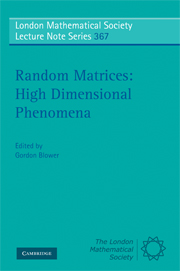Book contents
- Frontmatter
- Contents
- Introduction
- 1 Metric measure spaces
- 2 Lie groups and matrix ensembles
- 3 Entropy and concentration of measure
- 4 Free entropy and equilibrium
- 5 Convergence to equilibrium
- 6 Gradient flows and functional inequalities
- 7 Young tableaux
- 8 Random point fields and random matrices
- 9 Integrable operators and differential equations
- 10 Fluctuations and the Tracy–Widom distribution
- 11 Limit groups and Gaussian measures
- 12 Hermite polynomials
- 13 From the Ornstein–Uhlenbeck process to the Burgers equation
- 14 Noncommutative probability spaces
- References
- Index
8 - Random point fields and random matrices
Published online by Cambridge University Press: 05 March 2012
- Frontmatter
- Contents
- Introduction
- 1 Metric measure spaces
- 2 Lie groups and matrix ensembles
- 3 Entropy and concentration of measure
- 4 Free entropy and equilibrium
- 5 Convergence to equilibrium
- 6 Gradient flows and functional inequalities
- 7 Young tableaux
- 8 Random point fields and random matrices
- 9 Integrable operators and differential equations
- 10 Fluctuations and the Tracy–Widom distribution
- 11 Limit groups and Gaussian measures
- 12 Hermite polynomials
- 13 From the Ornstein–Uhlenbeck process to the Burgers equation
- 14 Noncommutative probability spaces
- References
- Index
Summary
Abstract
The distribution of the eigenvalues of a random matrix gives a random point field. This chapter outlines Soshnikov's version of the general theory. Starting with kernels, we introduce correlation functions via determinants. Gaudin and Mehta developed a theory of correlation functions for the generalized unitary ensemble which is known as the orthogonal polynomial technique, and we show that it fits neatly into the theory of determinantal random point fields. Particular determinantal random point fields are generated by the sine kernel, the Airy kernel, and the continuous Bessel kernels; in random matrix theory these are widely held to be universal kernels in that they describe the possible asymptotic distribution of eigenvalues from large Hermitian matrices. In the final section we introduce an abstract framework in which one can describe the convergence of families of determinantal random point fields, and which we apply to fundamental examples in Chapters 9 and 10.
In Sections 8.1 and 8.2, we describe how kernels can be used to form determinantal random point fields, and in Section 8.3 we express some classical results about unitary ensembles in terms of determinantal random point fields. In Sections 9.3, 9.4 and 9.5 we look at these specific examples in more detail, and see how they arise in random matrix theory.
Determinantal random point fields
In this section, we introduce Soshnikov's theory of determinantal random point fields as it applies to point fields on Z.
- Type
- Chapter
- Information
- Random Matrices: High Dimensional Phenomena , pp. 253 - 280Publisher: Cambridge University PressPrint publication year: 2009



